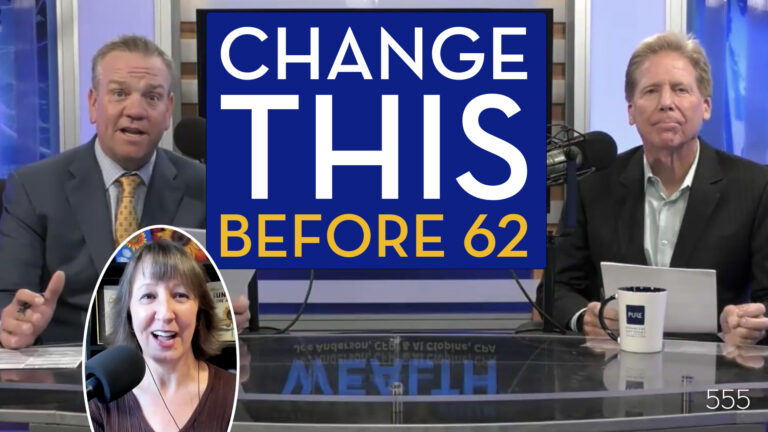In episode 37 of the YMYW podcast, Joe Anderson, CFP® and Big Al Clopine, CPA answer questions on investing for retirement, and they share strategies for managing your portfolio during an election year. Original publish date June 11, 2016 (hour 2). Note that content may be outdated as rules and regulations have changed.
00:00 – Intro
06:32 – “When you inherit a retirement account, it blows up on the heirs because it’s [taxed at] ordinary income for the heirs”
08:20 – “With this Bipartisan Policy Center, one of the things they want to do is get rid of the stretch IRA because it’s really a pretty good deal”
12:20 – “Can an SEC licensed broker-dealer transfer your 401(k) account into an IRA without your permission?”
13:38 – “Your retirement accounts are separate properties…there’s no such thing as a joint retirement account”
18:54 – “I am 47 years old. I have around $100K in a Traditional IRA. I haven’t contributed anything in that account for a long time now. My current job offers a 457 and 401a plan, which I try to contribute to every paycheck. Should I transfer my Traditional IRA funds to my job’s 401a or 457 account? What are the tax consequences of that transfer? Should I just keep my Traditional IRA and use it until I retire? If I transfer that money to the 457 or 401a account, should I do it in a one time transfer or installment transfers (in 5 or so years for less of a tax penalty)?
19:57 – “There’s no reason to roll the IRA in the plan. I will give you an advantage.. but let’s say you decide to keep it separate – there are advantages to that but probably the main one is you have more investment choices when it’s in an IRA”
21:44 – “One benefit of the 457 plan is that you can take that money out at any age”
23:47 – “I have read about the presidential election cycle and am curious as to what actions I should be taking in terms of my asset allocation. When should I take those actions? How conservative would you recommend I become prior to the election? What are the most effective portfolio management strategies you would recommend in order to maintain or at least mitigate risk? I am a small time investor. I work with a small amount in an online brokerage account as well as accounts with companies such as Acorns and Betterment. I do have the ease and benefit of diversifying risk away (referring to the Modern Portfolio Theory)”
25:22 – “Here’s my answer: there’s no evidence that there’s any sort of market swing one way or another with a presidential election. It can happen and it may happen but there’s no reason to make any drastic changes in your portfolio just because of that”
29:42 – “My wife and I are 83 years old. We will sell our home for about $400,000. Will we pay capital gains tax when moving to an apartment for $2,500/month?”
31:56 – “It’s June and I have not taken my RMD (required minimum distribution). Should I let the funds grow until end of the year or take average withdrawals until end of the year?”
33:34 – “I am 69 years old. My husband is 71 years old. We cannot afford the note on our home with our retirement income. We have two annuities. One for $300,000 and one for $600,000. Both are about 3-6 years old. I want to know if I cash in the $300,000 annuity, what kind of penalties and taxes will I have to pay?”
34:00 – “The first question you should ask yourself is: is the annuity in a retirement account or not? If not, every dollar you pull out is fully taxable”
Listen to the YMYW podcast:

Amazon Music
AntennaPod
Anytime Player
Apple Podcasts
Audible
Castbox
Castro
Curiocaster
Fountain
Goodpods
iHeartRadio
iVoox
Luminary
Overcast
Player FM
Pocket Casts
Podbean
Podcast Addict
Podcast Index
Podcast Guru
Podcast Republic
Podchaser
Podfriend
PodHero
podStation
Podverse
Podvine
Radio Public
Rephonic
Sonnet
Spotify
Subscribe on Android
Subscribe by Email
RSS feed

YouTube Music
IMPORTANT DISCLOSURES:
Pure Financial Advisors is a registered investment advisor. This show does not intend to provide personalized investment advice through this broadcast and does not represent that the securities or services discussed are suitable for any investor. Investors are advised not to rely on any information contained in the broadcast in the process of making a full and informed investment decision.
• Investment Advisory and Financial Planning Services are offered through Pure Financial Advisors, LLC, a Registered Investment Advisor.
• Pure Financial Advisors LLC does not offer tax or legal advice. Consult with your tax advisor or attorney regarding specific situations.
• Opinions expressed are not intended as investment advice or to predict future performance.
• Past performance does not guarantee future results.
• Investing involves risk including the potential loss of principal. No investment strategy can guarantee a profit or protect against loss in periods of declining values.
• All information is believed to be from reliable sources; however, we make no representation as to its completeness or accuracy. As rules and regulations change, content may become outdated.
• Intended for educational purposes only and are not intended as individualized advice or a guarantee that you will achieve a desired result. Before implementing any strategies discussed you should consult your tax and financial advisors.
CFP® – The CERTIFIED FINANCIAL PLANNER™ certification is by the Certified Financial Planner Board of Standards, Inc. To attain the right to use the CFP® designation, an individual must satisfactorily fulfill education, experience and ethics requirements as well as pass a comprehensive exam. Thirty hours of continuing education is required every two years to maintain the designation.
AIF® – Accredited Investment Fiduciary designation is administered by the Center for Fiduciary Studies fi360. To receive the AIF Designation, an individual must meet prerequisite criteria, complete a training program, and pass a comprehensive examination. Six hours of continuing education is required annually to maintain the designation.
CPA – Certified Public Accountant is a license set by the American Institute of Certified Public Accountants and administered by the National Association of State Boards of Accountancy. Eligibility to sit for the Uniform CPA Exam is determined by individual State Boards of Accountancy. Typically, the requirement is a U.S. bachelor’s degree which includes a minimum number of qualifying credit hours in accounting and business administration with an additional one-year study. All CPA candidates must pass the Uniform CPA Examination to qualify for a CPA certificate and license (i.e., permit to practice) to practice public accounting. CPAs are required to take continuing education courses to renew their license, and most states require CPAs to complete an ethics course during every renewal period.









